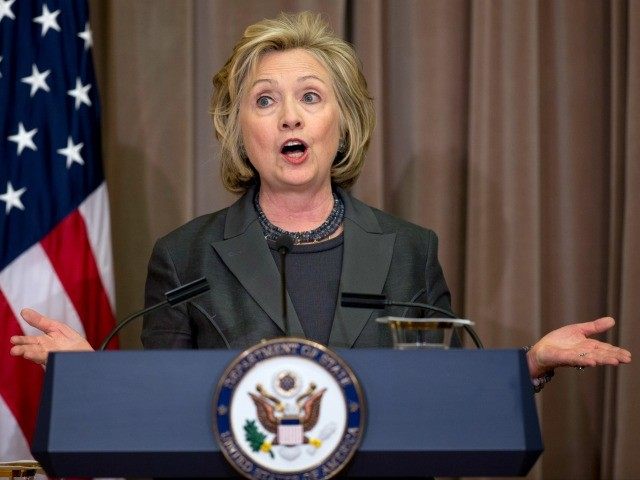Despite claims to the contrary, former Secretary of State Hillary Clinton emailed top State Department aides on their private email accounts regarding official government matters like the Benghazi scandal.
The New York Times reported that a review of the roughly 300 emails from Clinton’s personal account that Congress has shows “that Mrs. Clinton’s top aides at times corresponded with her about State Department matters from their personal email accounts, raising questions about her recent assertions that she made it her practice to email aides at their government addresses so the messages would be preserved, in compliance with federal record-keeping regulations.”
After lawmakers grilled a State Department official on Benghazi in 2012, Clinton reportedly emailed an adviser and asked, “Did we survive the day?” The adviser reportedly replied, “Survive, yes.”
According to the Times, at least four of Clinton’s closest advisers at the State Department–chief of staff Cheryl Mills, spokesperson Philippe Reines, top confidante and deputy chief of staff Huma Abedin, and foreign policy adviser Jake Sullivan–communicated with Clinton about government matters via their private email accounts.
Clinton and her team had insisted that Clinton emailed her aides on their government email accounts concerning government matters.
“Like secretaries of state before her, she used her own email account when engaging with any department officials,” Clinton spokesperson Nick Merrell previously said in response to the original Times report about Clinton’s use of a private email account. “For government business, she emailed them on their department accounts, with every expectation they would be retained.”
Regarding the most recent report, Merrill told the Times that it was “their practice to primarily use their work email when conducting state business with only the tiniest fraction of the more than one million emails they sent or received involving their personal accounts.”
Clinton admitted that she turned over nearly 30,000 of her “work-related” emails to the State Department while deleting more than 30,000 emails that she and her team deemed to be “personal.” The descriptions of her personal emails that the Times received, though, reveal why Clinton’s critics on both sides of the aisle have insisted that a third-party arbiter should have determined which emails were solely “personal.” Some of those “private” emails could shed light on what Clinton actually knew about the Benghazi attacks and whether she intentionally deceived Americans in its aftermath.
After then-U.S. Ambassador to the United Nations Susan Rice went on the Sunday shows to spin that the Benghazi attacks were “spontaneous,” Sullivan, Clinton’s foreign policy adviser, reportedly emailed Clinton and said that Rice “did make clear our view that this started spontaneously then evolved.” But after it became clear that the Benghazi attacks did not “spontaneously” occur in response to an anti-Islam YouTube video, Sullivan, after monitoring Clinton’s public statements on the matter in the two weeks after Rice’s appearances on the Sunday shows, reportedly emailed Clinton, “You never said ‘spontaneous’ or characterized their motivations.”
Last week, Rep. Trey Gowdy (R-SC), who chairs the House Select Benghazi Committee, subpoenaed the emails of “close to a dozen” aides, including “aides of aides,” who worked for Clinton at the State Department. He also asked Clinton to turn over her email server to a third-party arbiter and threatened potential legal action if Clinton did not relinquish it.
Gowdy has previously indicated that there are “huge gaps” in Clinton’s personal emails that have been turned over to Congress.
“There are gaps of months and months and months. And if you think to that iconic picture of her on a C-17 flying to Libya, she has sunglasses on and she has her handheld device in her hand, we have no e-mails from that day. In fact, we have no e-mails from that trip, Gowdy recently said on CBS’s Face the Nation. “So, it’s strange credibility to believe that if you’re on your way to Libya to discuss Libyan policy that there’s not a single document that has been turned over to Congress. So, there are huge gaps. And with respect to the president, it’s not up to Secretary Clinton to decide what is a public record and what’s not.”
Polls have found that majorities of Americans want Clinton to testify before Congress about the matter and turn over her server to a third-party arbiter. And a CNN/ORC poll last week found that a majority of Americans believe that Clinton “did something wrong” with her private email account.

COMMENTS
Please let us know if you're having issues with commenting.